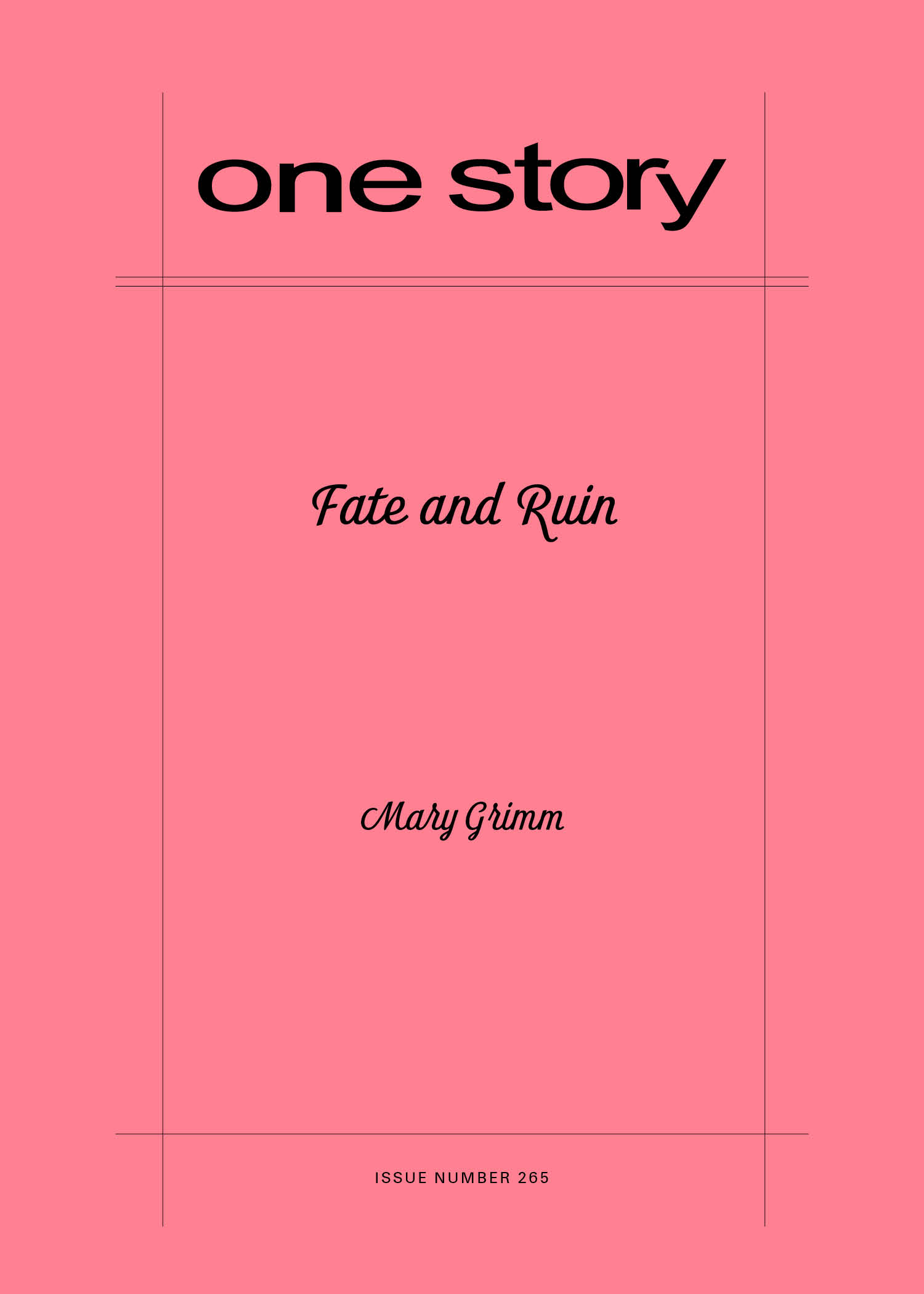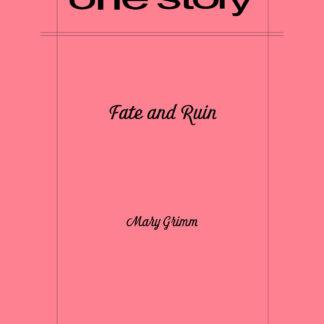
Fate and Ruin
$2.50
86 in stock
Excerpt
All that week, Bob Lilly was working on the gas tank of his car, which had to be replaced. He was doing it in my driveway because he lived with his sister, and she wouldn’t let him do it at her house. He was the smartest person I had ever met, which didn’t mean that he was in any way a success in life or had as much sense as my cat.
Inside, I was doing the dishes and making dinner. I had calculated that the gas tank was about fifteen feet away from the kitchen. Bob was smoking a cigarette while he wrestled with the clamps that held the tank on. Supposedly, the tank was empty. I hadn’t asked Bob about it because I knew he would say that it was perfectly safe. He would quote statistics about people who replaced their own gas tanks with absolute safety. Seventy-eight percent of these people would have been smokers, and they would have come out of the process unscathed.
Mary Grimm
Mary Grimm is the author of a novel, Left to Themselves, and a story collection, Stealing Time, both by Random House. Her stories have most recently appeared in The New Yorker, South Carolina Review, and Greensboro Review. Currently she is working on a novel set in 1930s Cleveland. She teaches fiction writing at Case Western Reserve University.
Will Allison on “Fate and Ruin”
Dorrie, the main character of Mary Grimm’s “Fate and Ruin,” has gotten herself into a pickle. She left her happy life as a bartender in sunny Palm Coast, Florida, to move to Cleveland with Jerry, a guy she met during a night of barhopping. But not long after she and Jerry get to Ohio, they break up, and now Dorrie finds herself stranded in Cleveland, living alone, trying to figure out what comes next.
Unfortunately, finding direction has never been Dorrie’s strong suit. It doesn’t help that her social circle is mostly limited to three people: Rose, her sad-sack neighbor; Jerry, her ex; and Bob Lilly, a self-styled polymath that Dorrie has a history with. But at least Dorrie has a job. She works as the assistant office manager at a slightly shady day care that gets some unexpected news:
“The whole day care had their feathers in an uproar because some celeb was going to bring their kid there while they were shooting a movie in Cleveland. I didn’t get excited about it because a) the celeb wasn’t going to be hanging out at the day care; and b) how big of a celeb could they be if they were coming to our day care, which I said, and which made me massively unpopular. But come on—it was not going to be Chris Pratt’s kid or Chris Hemsworth’s or any of the Chrises. It was going to be the kid of Girl in Restaurant or Guy Who Gets Pushed Out of Airplane.”
That voice—Dorrie’s frank, irreverent running commentary—is the irresistible current that carries this story along. It’s also what made the story so unputdownable for me, especially when four-year-old Minkie arrives at the day care and attaches herself to Dorrie, leading to one of the funniest and most tender endings I’ve read in a long time. As a fan of Mary Grimm’s work for more than thirty years, I’m very happy to be sharing this story with you.
Q&A by Will Allison
- WA: Where did the idea for this story come from?
- MG: There were two ideas that came together as the germ of this story. One was something that happened to someone I knew—they were planning to move with a fairly new partner to another city, and I couldn’t help but wonder, what if that doesn’t work out? What if you did that, and then broke up, and you were stranded in this new place? The second was a memory from long ago, when a friend of mine did in fact replace his gas tank in my driveway. I imagined Dorrie looking out of her kitchen window at the gas tank. Who was she looking at? As she and I watched, Bob Lilly leapt into being, smoking a cigarette and spouting off random facts.
- WA: What was the most challenging aspect of writing this story?
- MG: The ending. I wrote about half of the story in one go, and then some weeks later, most of the rest of it. But I couldn’t figure out where it was going, or what should happen at the end. For a while, the person who brings Minkie to the day care was someone Dorrie used to know, her old boyfriend’s little sister who had moved to California and was working in the movie business. But this posed endless difficulties, as introducing a new character so often does. The sister needed a backstory, and so did the old boyfriend, and that stuff started to take over the story. It occurred to me that I’d set up a sort of triangle—Bob Lilly, Jerry, and Dorrie—and that maybe I needed to resolve that in some way. But how? At that point, I did a close reading of my own story draft, looking at all of the mentions of Bob and Jerry, counting them up and actually making a list, and then sort of analyzing them for mood and content. It became obvious that Dorrie and Bob should be having some kind of a moment at the end, and finally I started to see how I could finish it.
- WA: The thing I love most about “Fate and Ruin” is Dorrie’s voice: her language, her phrasing, her distinctive sensibility. What goes into crafting such a convincing, engaging voice?
- MG: I’ll be honest: there was no crafting involved. From the first moment I started writing this story, Dorrie’s voice was in my head. I just had to stay true to that voice, and to her.
- WA: Another thing I love is the story’s humor. It’s sort of deadpan, thoroughly integrated with Dorrie’s character, in that she never sounds like she’s trying to be funny. Can you talk about the role of humor in this story?
- MG: I like to write stories that are mixed in their affect—not entirely serious, nor entirely funny—which is how the world seems to me, most days. This story is a light sort of story, with a lot of humor, but there is an understructure of pain and loss, as there is in everyone’s life, which is hinted at here and there.
- WA: At times the chronology of “Fate and Ruin” is a tangle, driven more by Dorrie’s thoughts than by plot, but the timeline nicely mirrors Dorrie’s jumbled state of mind. Was that intentional?
- MG: I’d like to say yes, but, in fact, no. I’m not the most meticulous plotter, and the timelines of my stories are often a little unreliable. Fortunately, that works here.
- WA: Why did you set “Fate and Ruin” in Cleveland?
- MG: Well, I live in Cleveland, and I’m comfortable writing about it—that’s the main reason. But also, as I mentioned, I had the idea of being stranded in a place you hadn’t intended to go, and it occurred to me that it was a sort of funny idea, that someone would leave Florida (widely thought of as an ideal place to live) to go to Cleveland (widely thought to be the opposite, although I don’t think of it that way at all!).
- WA: Finish this sentence in just one word—the word you think best captures it: “This story is about __________.”
- MG: I never know how to answer questions like this! I don’t tend to think about theme or meaning when I’m writing, or after, for that matter. For me, the story is about Dorrie, who is a gloriously flawed character, someone who keeps trying even when nothing seems to work, who is never going to give up, and who has a sardonic running commentary going on in her head at all times.
- WA: How long did it take you to complete this story?
- MG: I believe that I got the original idea for the story maybe three years ago? I didn’t start writing it until sometime in 2018 and, as I noted above, worked on it in fits and starts for a while. I finished it in the summer of 2019.
- WA: What are you working on now?
- MG: My big project is a novel, based on my mother’s life, set in 1930s Cleveland. This started as an attempt to understand more about her. She was a talkative and cheerful woman who told a lot of stories about her early life, but my sister and I came to understand that these stories were curated, that she hid a lot, didn’t talk about certain things, or presented them in a way that glossed over or transmuted things that were painful. But as I’ve gotten further into it, I think it’s also about what it was like to be a woman then, about women’s roles, about what marriage meant, about making your way through life in difficult times.
- WA: What is the best bit of advice about writing you have ever received?
- MG: Best writing advice comes via Nike (although Nike didn’t have me and my writing specifically in mind): Just do it.
